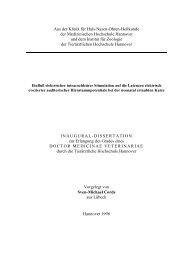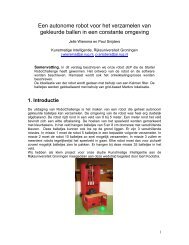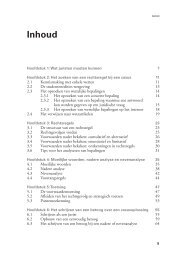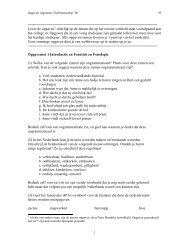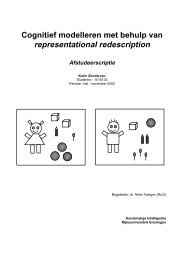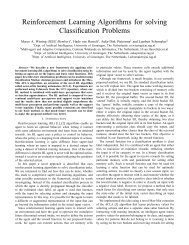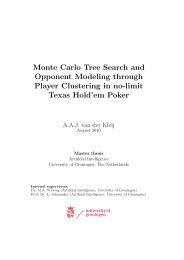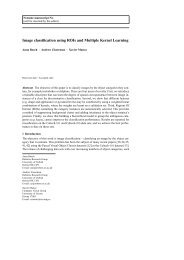Presuppositions in Spoken Discourse
Presuppositions in Spoken Discourse
Presuppositions in Spoken Discourse
You also want an ePaper? Increase the reach of your titles
YUMPU automatically turns print PDFs into web optimized ePapers that Google loves.
Chapter 2<br />
(1999, p. 6). In the follow<strong>in</strong>g, if ϕ is an utterance that presupposes χ,we can write<br />
this as ϕ{χ}.<br />
(8) a. not ϕ{χ}<br />
b. it is possible that ϕ{χ}<br />
c. a believes that ϕ{χ}<br />
d. if ϕ{χ} then ψ<br />
e. either ϕ{χ} or ψ<br />
Geurts (1999) po<strong>in</strong>ts out that some embedd<strong>in</strong>gs will make the presuppositional<br />
<strong>in</strong>ference seem stronger than others, but that generally presuppositions will project<br />
out of negated and modal contexts, e.g. above <strong>in</strong> (8) a and (8)b. 1<br />
The easiest way to get the hang of identify<strong>in</strong>g presuppositions is to look at<br />
several examples, vary<strong>in</strong>g the embedd<strong>in</strong>gs and assur<strong>in</strong>g yourself that the<br />
presupposition survives. Below examples sentences are given with each of the<br />
triggers that are studied later <strong>in</strong> the corpus: factives, aspectual verbs, it-clefts, too<br />
and def<strong>in</strong>ite NPs. First the a-sentences presented the trigger used without an<br />
embedd<strong>in</strong>g, with the trigger underl<strong>in</strong>ed. The b-sentences give the same sentence<br />
but <strong>in</strong> one of the embedded contexts given <strong>in</strong> (8). The c-sentences give the <strong>in</strong>duced<br />
presupposition.<br />
(9) factive verb matter with a sentential subject complement<br />
a. That it is already November matters.<br />
b. That it is already November doesn’t matter.<br />
c. It is already November.<br />
(10) factive verb regret with a sentential object complement<br />
a. Andy regrets choos<strong>in</strong>g the fish.<br />
b. Andy regrets choos<strong>in</strong>g the fish.<br />
c. Andy chose the fish.<br />
(11) factive adjective glad with sentential object complement<br />
a. Henk is glad that Re<strong>in</strong>hard came to visit.<br />
b. Rob believes that Henk is glad that Re<strong>in</strong>hard came to visit.<br />
c. Re<strong>in</strong>hard came to visit.<br />
(12) aspectual verb, quit<br />
a. Rob totally quit smok<strong>in</strong>g.<br />
b. If Rob totally quits smok<strong>in</strong>g, he will probably be <strong>in</strong> a bad mood all the time.<br />
1 Note also that it is well known that some triggers cannot be embedded under all contexts. For<br />
example, positive polarity items like rather and too can’t be embedded <strong>in</strong> negative contexts (see van<br />
der Sandt 1988, Geurts 1999). Because of this, the presupposed <strong>in</strong>formation of positive polarity<br />
items cannot be identified by us<strong>in</strong>g the negation test. For example, you can’t embed too under<br />
negation because <strong>in</strong> a negated sentence you have to use its negative polarity counterpart, either,<br />
e.g. *I don’t like fruit too, vs. I don’t like fruit either. Too is the only trigger studied <strong>in</strong> the corpus work<br />
that fails the negation test because of polarity.<br />
8



